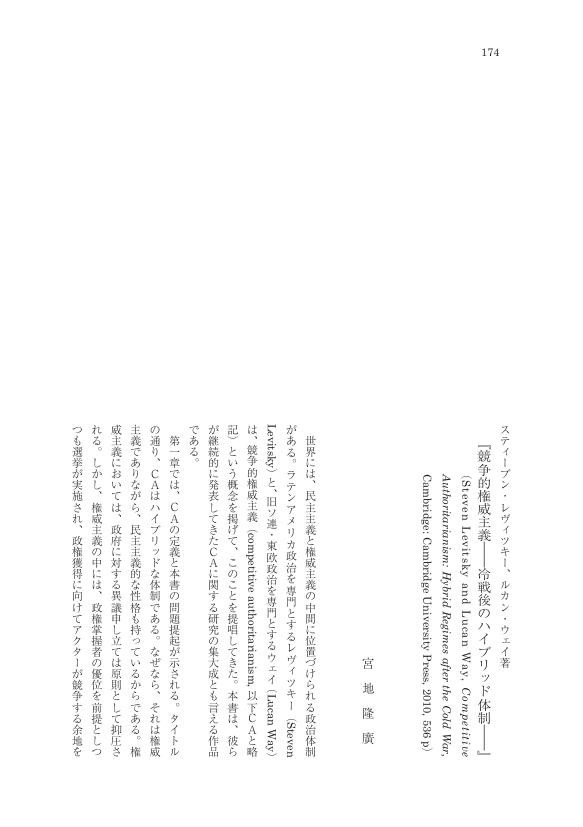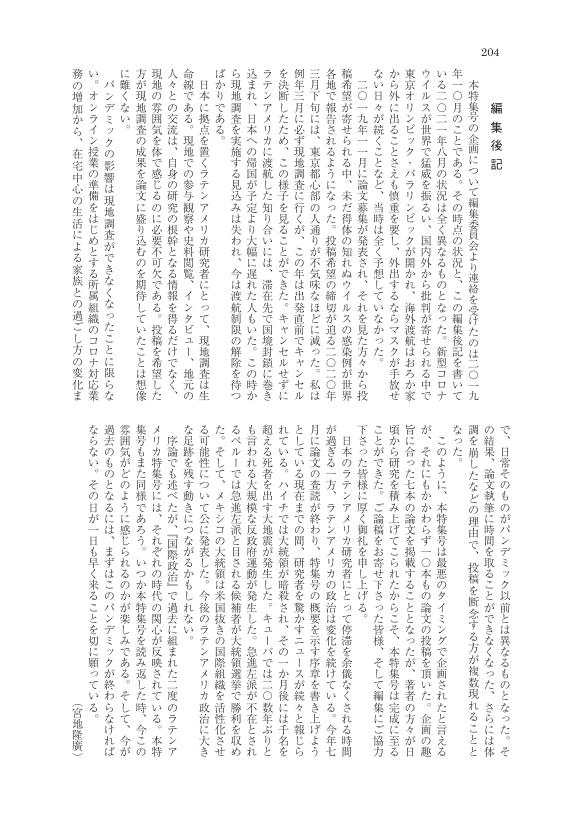- 著者
- 宮地 隆廣
- 出版者
- 一般財団法人 日本国際政治学会
- 雑誌
- 国際政治 (ISSN:04542215)
- 巻号頁・発行日
- vol.2013, no.174, pp.174_174-174_177, 2015-09-15 (Released:2015-07-28)
1 0 0 0 編集後記
- 著者
- 宮地 隆廣
- 出版者
- 一般財団法人 日本国際政治学会
- 雑誌
- 国際政治 (ISSN:04542215)
- 巻号頁・発行日
- vol.2022, no.207, pp.207_204, 2022-03-30 (Released:2022-03-31)
- 著者
- 宮地 隆廣
- 出版者
- 一般財団法人 日本国際政治学会
- 雑誌
- 国際政治 (ISSN:04542215)
- 巻号頁・発行日
- vol.2022, no.207, pp.207_1-207_16, 2022-03-30 (Released:2022-03-31)
- 参考文献数
- 37
This article serves as an introduction to the third special issue of International Relations on Latin American politics. Following the two previous prefaces, it reviews relevant literature to map out arguments about the development of democratization in the region and its domestic and international determinants. This helps to clarify the features and novelty of the papers included in this issue.The twenty Latin American countries of the present century have been experiencing a slow deterioration of democracy. It is noteworthy that this is not occurring in all the countries: some have maintained a responsible democratic government while others have fallen into full autocracy. The most popular explanation of this divergence is that an unconsolidated party system gives room for the rise of a radical left president, who would destroy the checks and balances among governmental bodies and limit civil liberties. However, as recent literature points out, a party system is not the only deciding factor of the fate of democracy. Constitutional arrangement of political institutions, such as de jure power given to the executive body, and public support to the government also encourages or discourages the autocratic behavior of a president. It is not still clear which of these factors is the most crucial and how they relate to each other.As mentioned above, emphasizing the difference between Latin American politics in this century and those in the previous one runs the risk of obscuring the continuity between them. The focus on individual research topics rather than the degree of democratization of the central government as a whole sheds light on unchanged political characteristics over the centuries (e.g. persistence of sub-national authoritarianism) and the cause-and-effect relationship between them (e.g. governance reform in the 20th century as the foundation of technocrat-driven policy making in the next century).New trends in international affairs, such as the emergence of regional organizations without the United States of America (e.g. UNASUR), growing economic influence of China, and globalization of non-governmental activities also have some influence on domestic politics. It is important to note that each international factor plays a complex role in the democratization process. For example, globalization leads to growth of transnational crime organizations that are likely to undermine civil liberties by taking a devastating toll on civil security and provoking iron fist reactions from the government. However, globalization also empowers civil society by creating transnational solidarity with victims. Finally, amid the serious fragmentation of international relations in the Americas mainly caused by ideological conflicts among the governments, the Japanese government, which has made the promotion of democracy one of its foreign policies toward Latin America, has the potential to contribute to the democratization of the countries of the region.
1 0 0 0 OA 地域研究の対象とアプローチ再考
- 著者
- 宮地 隆廣 Takahiro Miyachi
- 出版者
- 同志社大学言語文化学会
- 雑誌
- 言語文化 = Doshisha Studies in Language and Culture (ISSN:13441418)
- 巻号頁・発行日
- vol.14, no.4, pp.377-400, 2012-03-10
本稿は、地域研究の扱う範囲とアプローチについて、先行研究に対する批判的検討を通じ、その妥当なあり方を提示する。第1に、地域研究の扱う知識の範囲は特定の空間、時代、テーマおよび方法論によって制限されるべきではない。第2に、研究に値する知識は、既存の地域イメージを覆すものか、社会や学界で価値の認められるテーマに関連するものに限られる。第3に、研究のアプローチは、科学的なものと多声的なものに分けられる。
1 0 0 0 IR ボリビア2019年選挙をめぐる紛争
- 著者
- 宮地 隆廣
- 出版者
- 日本貿易振興機構アジア経済研究所
- 雑誌
- ラテンアメリカ・レポート (ISSN:09103317)
- 巻号頁・発行日
- vol.37, no.1, pp.1-13, 2020
<p>ボリビアの2019年国政選挙は実施後に大規模な市民の抗議行動を引き起こし、当時の現職大統領であり同選挙で4選を果たしたモラレスの亡命を招いた。この事件に対しては、(1)モラレス側を強く批判する説明、(2)モラレス退陣を求める側を強く批判する説明、そして(3)ボリビアと同時期に大規模抗議運動が発生した国々との共通点を指摘する説明がある。本稿はそのいずれもが事態の説明としては過度に単純化されたものであることを指摘する。第一に、(1)と(2)は自らが擁護する側の暴力や不正の可能性に沈黙している。第二に、(1)が指摘する選挙における不正はいまだ実態不明であり、それを既成事実とした批判は成立しない。第三に、(2)は革新モラレスと保守的な抵抗勢力の対立として今回の紛争を捉えるが、革新勢力が反モラレス側にいることを無視している。第四に、(3)が重視する紛争の要因としての経済悪化やそれに伴う市民の不満の高まりについて、それを裏付けるデータは不十分なうえに、抗議行動が不透明な選挙過程を最も重視していた事実を看過している。</p>
- 著者
- 宮地 隆廣
- 出版者
- 日本貿易振興機構アジア経済研究所研究支援部
- 雑誌
- アジア経済 = Quarterly journal of Institute of Developing Economies Japan External Trade Organization (ISSN:00022942)
- 巻号頁・発行日
- vol.56, no.2, pp.106-109, 2015-06

